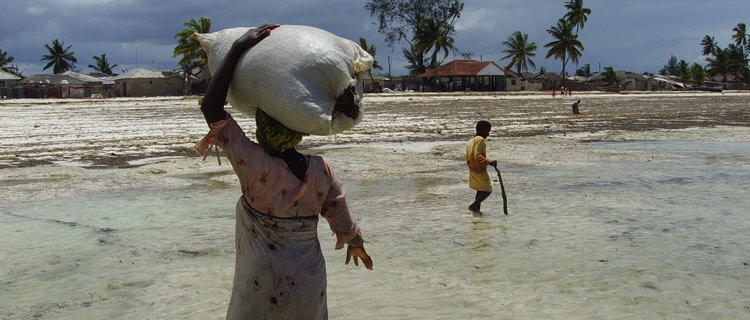Seaweed farming has been hailed as one of the most interesting alternatives to create new livelihoods in tropical developing countries. But serious health problems among female farmers has been identified. Centre researcher Maricela de la Torre-Castro explains.

Alternative livelihoods
The sea giveth and the sea taketh away
Benefits of seaweed farming questioned as serious health problems surface
More than 20 years after seaweed farming was introduced on the island of Zanzibar, it is still predominantly portrayed as a success. Arguments such as job creation for women and increased household income prevail and used as justifications for both corporate and developmental projects.
But a more nuanced picture is required.
Overlooked, but no longer
In a study recently published in Aquaculture, centre researcher Maricela de la Torre-Castro together with colleagues from Stockholm university and University of Dar es Salaam has identified serious health problems among female seaweed farmers on the island.
This has been largely overlooked in previous research.
A largely female occupation, seaweed farmers considered their health significantly poorer than non-seaweed farmers and reported issues like back pain, allergies, musculoskeletal pain, hunger, respiratory problems, eye related problems, injuries from hazardous animals and sharp shells.
"These problems are clearly associated with poor working conditions, intensive work and long exposure to sun, wind and seawater," says de la Torre-Castro.
In their study, a list of health problems was developed and an analysis was done to identify to what extent these health problems are present among seaweed farmers compared to non-seaweed farmers. This was then tested by interviewing 140 women from seven different villages.
An intergenerational trap
The most common response from the women was that seaweed farming was energy consuming and physically hard compared to the low income it generates. In fact, most seaweed farmers' earnings were below the absolute poverty level but a lack of stable economic activities and the abandoning of traditional activities force the women to continue.
Although 75 percent of the women clearly demonstrated a wish for their children to get an education in order to have a good job so as to avoid getting involved in the farming, most young girls follow the same path as their mothers. The tragic irony of it all is that the mothers continue working to support their childrens' education.
The women also fear seaweed farming have negative health effects on their children. Mothers reported how children show symptoms such as coughing and fever when seaweeds are stored at home. A possible explanation to these problems could be the exposure to toxic vapours released from the algae during the drying process.
It could still be a success story
De la Torre-Castro and her colleagues are not calling for the abolishment of seaweed farming, but rather to encourage changes towards better working conditions for the farmers.
"Since seaweed farming has implications for thousands of poor households worldwide and the Zanzibar case is normally used as a positive example, our study should provide a more nuanced picture to help improve the working conditions of this important livelihood," de la Torre-Castro says.
Source: Fröcklin, S., M. de la Torre-Castro, L. Lindström, N.S. Jiddawi, and F. E. Msuya. 2012. Seaweed mariculture as a development project in Zanzibar, East Africa: A price too high to pay? Aquaculture356—357:30—39
References
Fröcklin, S., M. de la Torre-Castro, L. Lindström, N.S. Jiddawi, and F. E. Msuya. 2012. Seaweed mariculture as a development project in Zanzibar, East Africa: A price too high to pay? Aquaculture356—357:30—39
Maricela de la Torres-Castro is an Assistant Professor at the Department of Systems Ecology Stockholm University and a Research Fellow at Stockholm Resilience Centre.
Her main interest is on the relationship between humans and nature and to understand institutional dynamics affecting natural resource use and management leading systems into sustainable or unsustainable ways.






